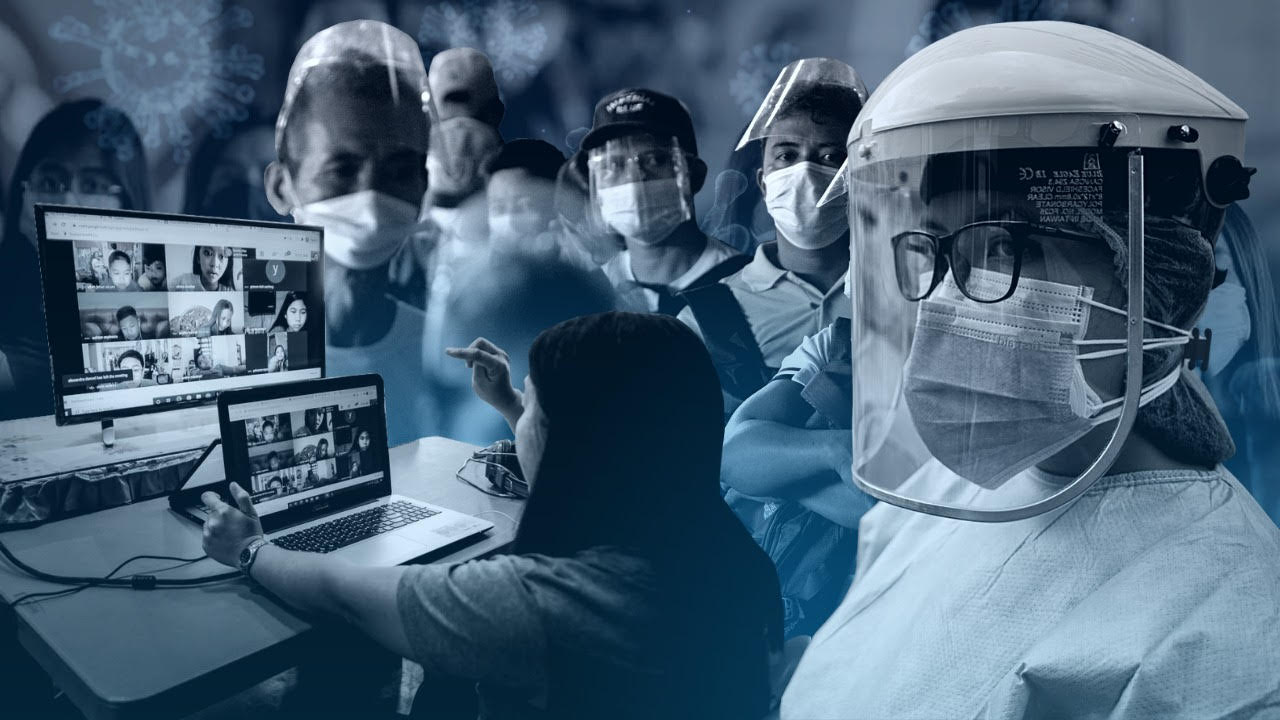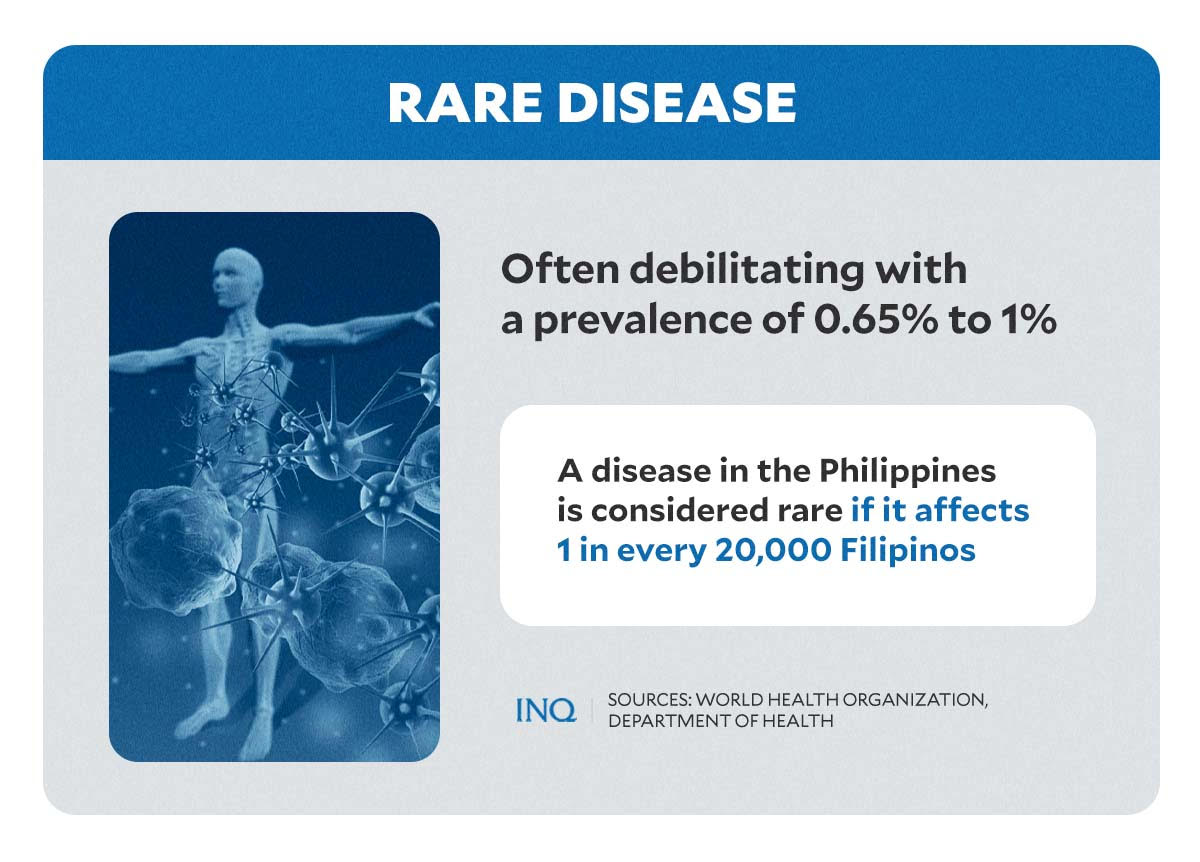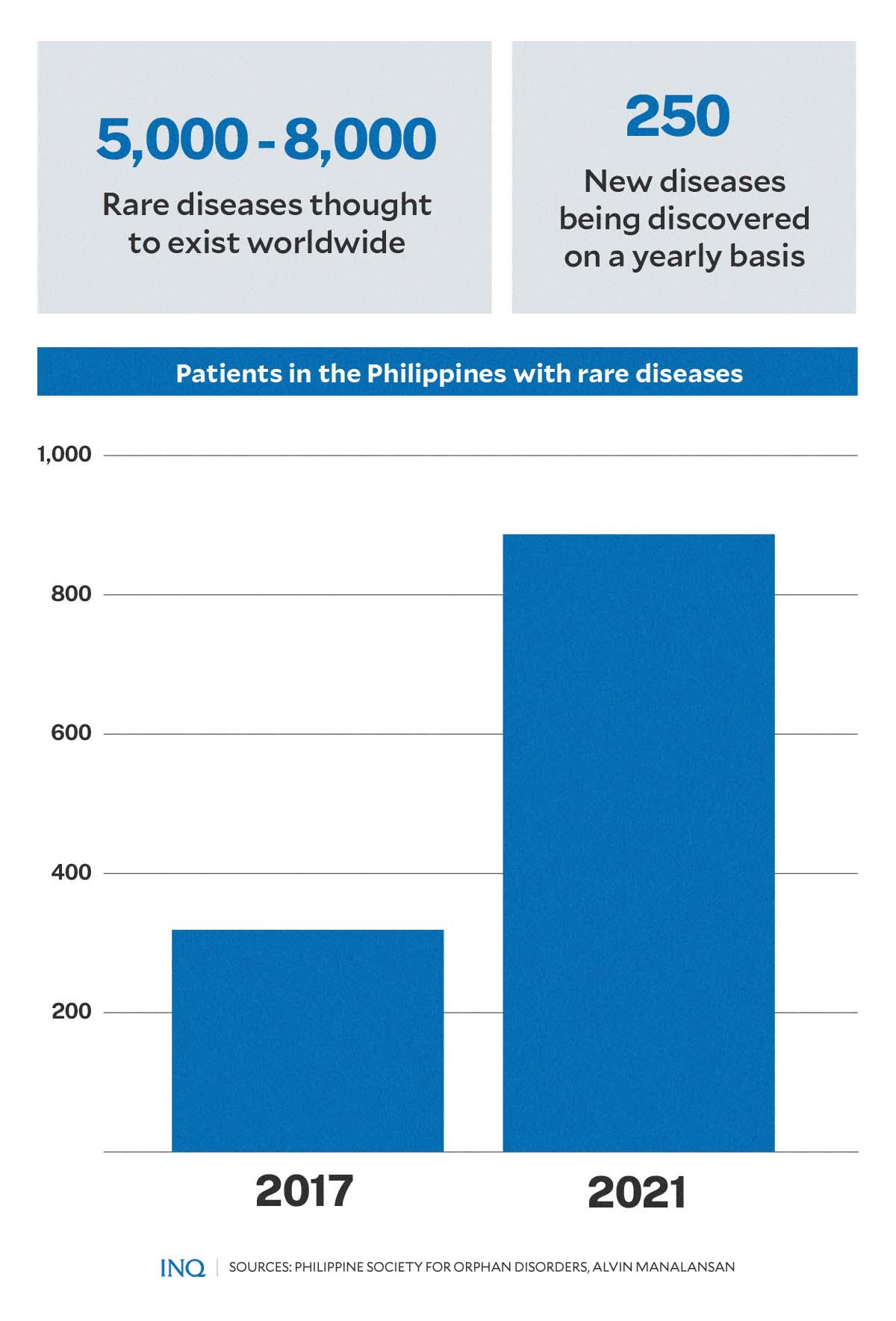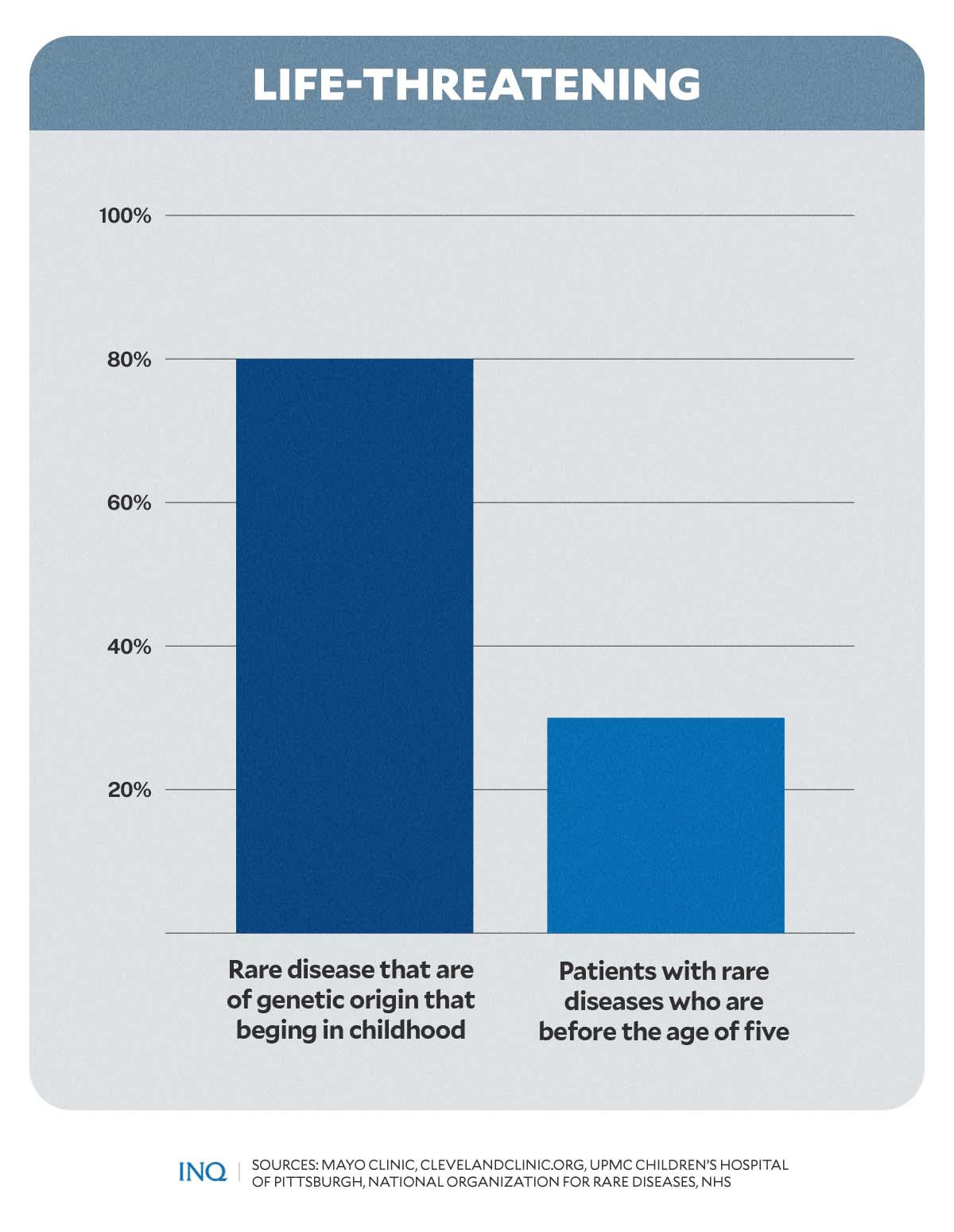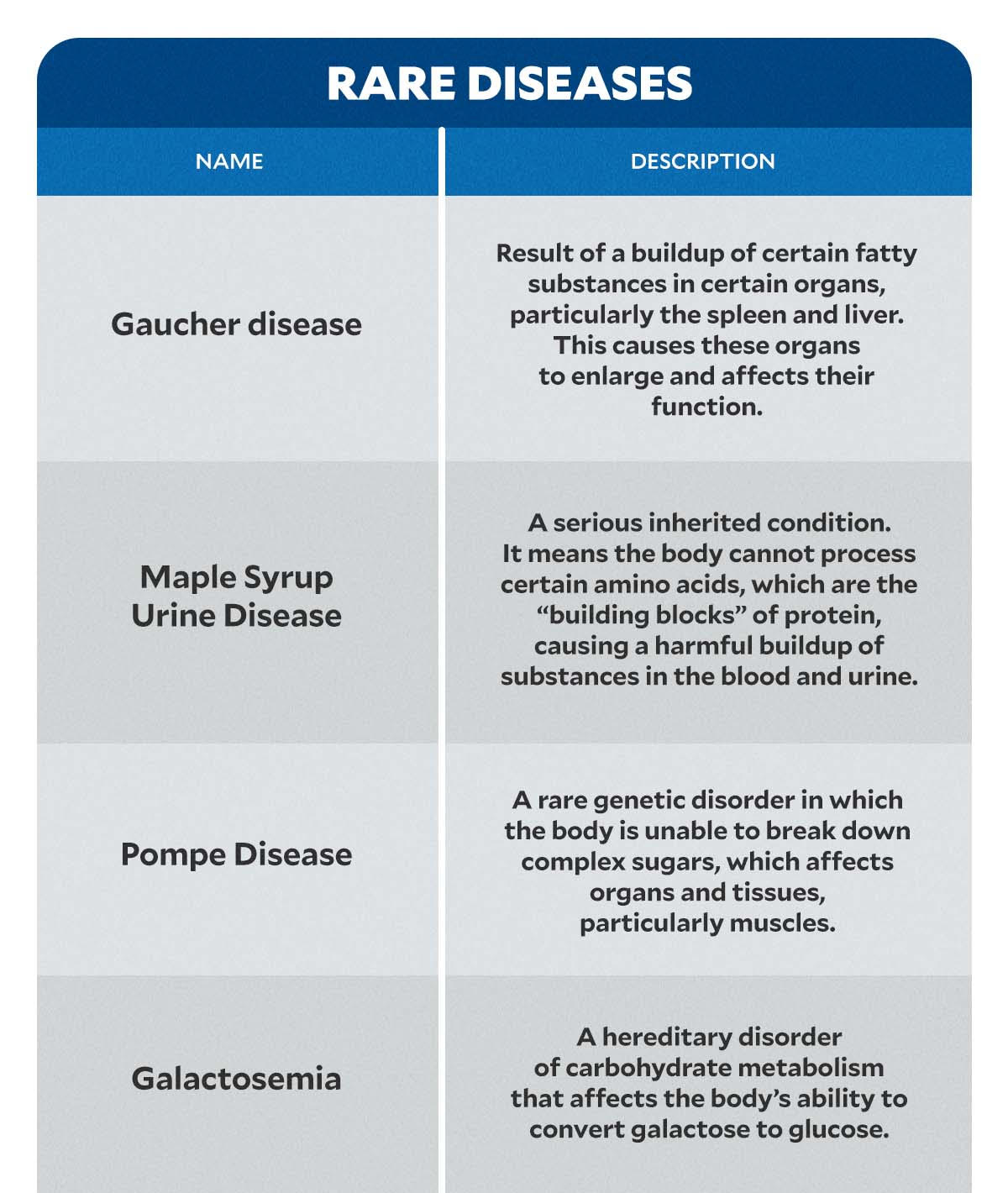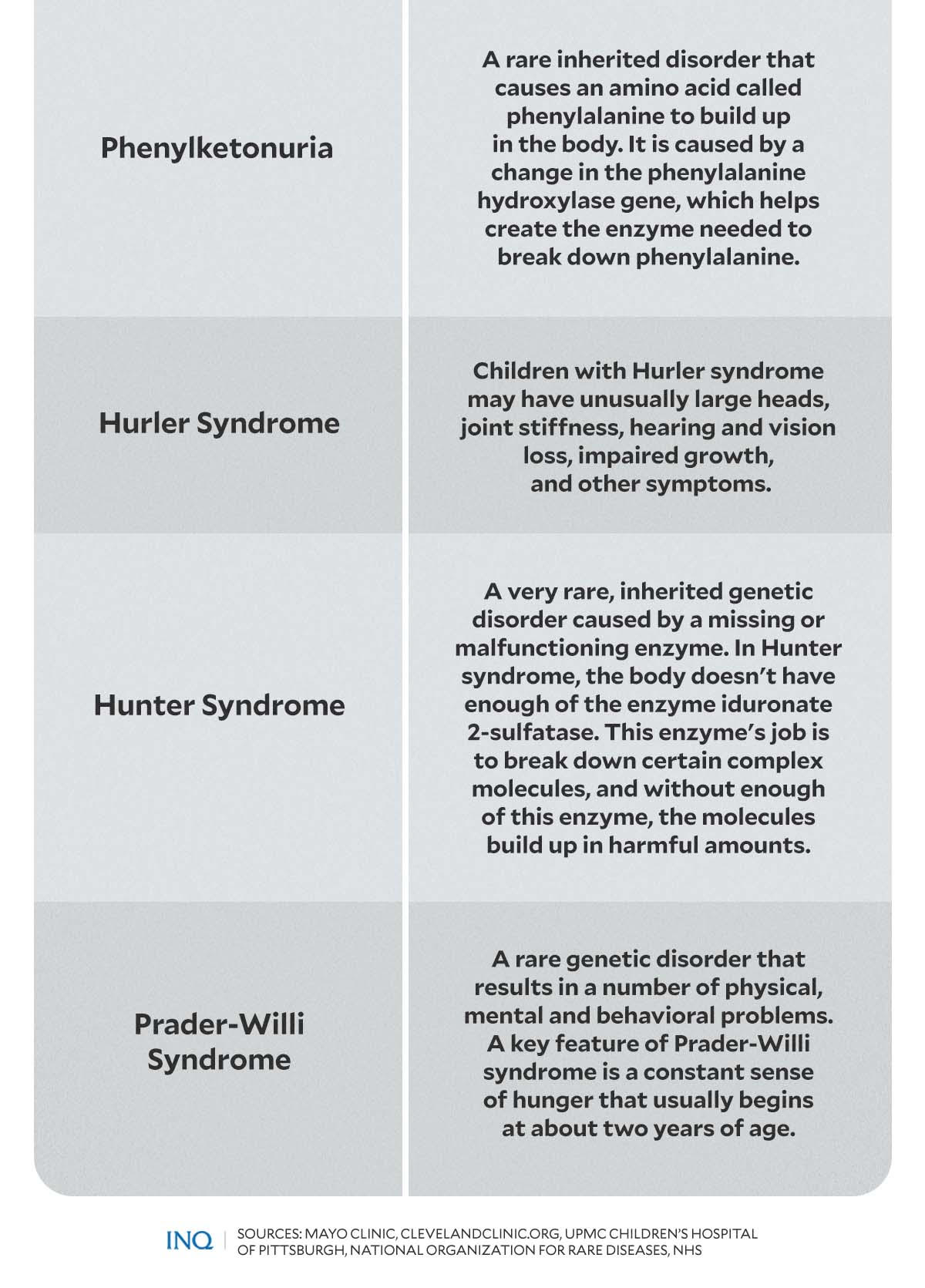Rare, deadly diseases in PH get attention from barely enforced law
MANILA, Philippines—Republic Act No. 10747, or the Rare Diseases Act, was signed in 2016 and gave “new hope” to Filipinos suffering from rare but often chronic and life-threatening diseases, the Department of Health (DOH) said.
But six years later, public health stakeholders stressed that the legislation has yet to be fully implemented, with Prof. Victorio Andres Manhit, president of the think tank Stratbase ADR Institute, saying that there is a “deeply complex issue of inequality”.
“There is an evident disproportion in the availability of treatment and resources, and this inequality is being aggravated by the COVID-19 pandemic,” he said in the hybrid town hall discussion, “The State of the Rare Disease Law: Continuing Implementation and the Delivery of Responsive Health Services to the Affected Population.”
“Now that Congress has earmarked P104.9 million for this after six long years, it is time all stakeholders work to address the deeply complex issue of inequality through good governance, political reforms, social investments and multi-sector efforts,” he said.
READ: Public health stakeholders urge gov’t to sustain Rare Disease Act
This, as it was only in 2022 that the law, which was signed to help address the problems confronting Filipinos with rare diseases, was given an allocation of P104.9 million in the General Appropriations Act.
Sen. Sonny Angara, chair of the Senate committee on finance, said there were funding challenges because of the pandemic and that the appropriation is hardly enough to provide treatment and fund research into new rare diseases.
However, he stressed the Senate’s commitment to support the cause, saying that the private sector should be encouraged and offered incentives to partner with the government in the fight against rare diseases.
Neglected
Alvin Manalansan, health care fellow of the Stratbase ADR Institute and co-convenor of UHC Watch, said every Filipino has the right to health and no one should be left behind.
He had said in a column that the law envisioned that Filipinos with rare diseases are diagnosed early and provided immediate access to interventions so that their rate of survival is increased, and they are given a chance to live a normal way of life.
But the COVID-19 pandemic, which has already claimed 61,720 lives, Manalansan stressed, “posed several challenges and showed the gaps” throughout the Philippines’ health system.
He said addressing the crisis has been the “priority and concern of the government for two years now, and still counting”. As a result, patients, like those who were diagnosed with rare diseases, “are sadly kept on the sideline”.
The DOH had said: “Because of the rarity of their disease, not much poor assistance was given to them in the past. There is scarcity in terms of expertise and available treatment for these patients in the country.”
It said the Rare Diseases Act, which was signed by the late President Benigno Aquino III, was expected to address these gaps and provide the much needed attention that Filipinos afflicted with rare diseases highly deserve.
Manhit stressed that this was the reason that it was high time for the government to address the problems confronting the implementation of the law, saying that it would guarantee access to responsive medical care.
Rare diseases
The World Health Organization defines a rare disease as an “often-debilitating disease or condition with a prevalence of 0.65 percent to 1 percent”.
Here in the Philippines, a disease is considered rare when it affects one patient in every 20,000 population: Patients afflicted with rare diseases often have their quality of life reduced to taking medications, check-ups and suffering from pain.
“They are often dependent on other people to attend to their basic needs. They also need lifelong medical care, food supplements, medications and multidisciplinary therapies to alleviate the symptoms and effects of the disease,” the DOH said.
RELATED STORY: Giving the rare disease world new hope
According to the Philippine Society for Orphan Disorders (PSOD), 5,000 to 8,000 rare diseases are thought to exist, with an estimated 250 new diseases being discovered on a yearly basis.
Angara had said in a bill he filed then that a rare disease or “orphan disorder” is afflicting less than 1,000 Filipinos and that many of the cases are because of genetic defects, with many patients exhibiting symptoms in early childhood.
“Unfortunately, there is minimal interest among research institutions in learning more about these diseases because they affect only a small segment of the population,” Angara stressed.
Likewise, because of the rarity of the diseases, medicines and health care products have been called “orphan drugs” because of minimal attention paid by pharmaceutical companies to them because of the high cost of production resulting from low demand.
Life-threatening
Because of this, Angara said some patients die as early as infancy or, if they manage to survive, suffer from chronic and debilitating illnesses that greatly diminish their quality of life, not to mention the severe strain on their families.
In a 2017 article published in the Science journal SciDev.Net, it was said that about 80 percent of rare diseases are of genetic origin that begin in childhood, with about 30 percent of patients dying before the age of five.
READ: Raising awareness about rare diseases nationwide
The PSOD said as of 2017, there are 319 patients in the PSOD registry, which accounts for 63 rare diseases. But Manalansan said as of 2021, there are already 887 cases registered with rare diseases.
Here are some of the rare diseases listed by the PSOD:
- Gaucher Disease
The Mayo Clinic said this disease is the result of a buildup of certain fatty substances in certain organs, particularly the spleen and liver. This causes these organs to enlarge and affects their function.
- Maple Syrup Urine Disease
NHS said this disease is a rare but serious inherited condition. It means the body cannot process certain amino acids, which are the “building blocks” of protein, causing a harmful buildup of substances in the blood and urine.
- Pompe Disease
This disease, according to clevelandclinic.org, is a rare genetic disorder in which the body is unable to break down complex sugars, which affects organs and tissues, particularly muscles.
- Galactosemia
Galactosemia, the National Organization for Rare Diseases said, is a rare, hereditary disorder of carbohydrate metabolism that affects the body’s ability to convert galactose to glucose.
- Phenylketonuria
The Mayo Clinic explained that Phenylketonuria is a rare inherited disorder that causes an amino acid, called phenylalanine, to build up in the body. It is caused by a change in the phenylalanine hydroxylase gene, which helps create the enzyme needed to break down phenylalanine.
Without the enzyme necessary to break down phenylalanine, a dangerous buildup can develop when a person with Phenylketonuria eats foods that contain protein or eats aspartame, an artificial sweetener.
- Hurler Syndrome
According to the UPMC Children’s Hospital of Pittsburgh, this syndrome is an inherited condition caused by a faulty gene. Children with Hurler syndrome lack an enzyme that the body needs to digest sugar.
As a result, undigested sugar molecules build up in the body, causing progressive damage to the brain, heart, and other organs.
Children with Hurler syndrome may have unusually large heads, joint stiffness, hearing and vision loss, impaired growth, and other symptoms.
- Hunter Syndrome
The Mayo Clinic explained that this syndrome is a very rare, inherited genetic disorder caused by a missing or malfunctioning enzyme. In Hunter syndrome, the body doesn’t have enough of the enzyme iduronate 2-sulfatase. This enzyme’s job is to break down certain complex molecules, and without enough of this enzyme, the molecules build up in harmful amounts.
- Prader-Willi Syndrome
This syndrome is a rare genetic disorder that results in a number of physical, mental and behavioral problems. A key feature of Prader-Willi syndrome is a constant sense of hunger that usually begins at about two years of age, the Mayo Clinic said.
